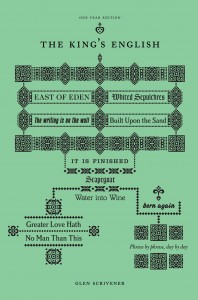Two are better than one
You have to pick your wedding encouragements carefully.
The story is told of an uncle who could not make it to the happy day and so telegrammed his greeting as a simple bible reference. It was 1 John 4:18:
“Perfect love casteth out fear.”
A word in season, as the good book says (Proverbs 15:23). Except that the telegram left off the all-important “1” at the beginning. So instead of reading out from First John – the letter – the best man read out the verse from John – the Gospel.
“For thou hast had five husbands; and he whom thou now hast is not thy husband.” (John 4:18)
If that verse is scandalous, here’s one that’s mischievous:
Live joyfully with the wife whom thou lovest all the days of the life of thy vanity, which he hath given thee under the sun, all the days of thy vanity: for that is thy portion in this life, and in thy labour which thou takest under the sun. (Ecclesiastes 9:9)
The verse is pure Ecclesiastes! Live joyfully… it’s vanity! Here is an “encouragement” for marriage “under the sun.”
Yet while few would put Ecclesiastes 9 on the wedding card, many write Ecclesiastes 4, which is strange:
6 Better is an handful with quietness, than both the hands full with travail and vexation of spirit. 7 Then I returned, and I saw vanity under the sun. 8 There is one alone, and there is not a second; yea, he hath neither child nor brother: yet is there no end of all his labour; neither is his eye satisfied with riches; neither saith he, For whom do I labour, and bereave my soul of good? This is also vanity, yea, it is a sore travail. 9 Two are better than one; because they have a good reward for their labour. 10 For if they fall, the one will lift up his fellow: but woe to him that is alone when he falleth; for he hath not another to help him up. 11 Again, if two lie together, then they have heat: but how can one be warm alone? 12 And if one prevail against him, two shall withstand him; and a threefold cord is not quickly broken.
In verse 6 Solomon begins by listing the benefit of singleness – quietness! But he observes from verse 7 and 8 that labour alone “is a sore travail.” Verse 9 is not, therefore, the most romantic vision of coupledom. It sees the benefits of togetherness in terms of “industries of scale”! And verse 11 envisions your other half as a human hot-water bottle.
The benefits of two “heads” – which is how the saying has most famously passed down to us – are not mentioned. The benefits of two are economic, militaristic and thermal.
It’s amazing how people will tend to sentimentalise sayings from Ecclesiastes. “There is a season” is not a beautiful protest song but a total resignation to the status quo. “A little bird told me” is not playful but sinister when on Solomon’s lips. Yet it’s interesting how much of Ecclesiastes finds its way into common parlance. Our culture resonates with this vision of “life under the sun”, which is unsurprising but also sad.
However, even “under the sun” we do not escape living in Christ’s world. And in Christ’s world it is perfectly explicable why two are better than one. From the beginning, the LORD said of Adam, “It is not good that the man should be alone.” (Genesis 2:18). And of course Adam was picturing for us Christ and His desire for a bride. We live in a world where the “travail and vexation of spirit” of community is – in the main! – outweighed by the benefits. Because we live in a world reflecting Christ’s desire for a bride.
In eternity He has determined to have a wife at all costs. Not for economic purposes – it would cost Him everything. Not to make Him stronger – at the cross He would be infinitely weakened to win her. Not simply to keep warm. He desires a bride because in His grace He delights to share all that He has.
Christ also loved the church, and gave himself for her (Ephesians 5:25)
This is the ultimate marriage. And it’s why, in our experience also, two are better than one.
Comments are closed.



